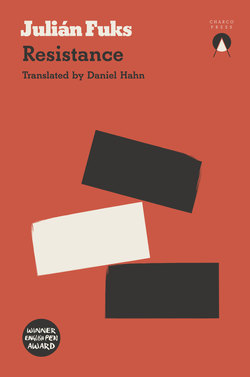Читать книгу Resistance - Julián Fuks - Страница 17
На сайте Литреса книга снята с продажи.
Оглавление11.
I see the young couple in a bleached-out image, a black and white photograph that time has faded more than it should have done. Something about their appearance makes them look strange, adding to the sense of anachronism – maybe the volume of their hair, the conspicuous pleats of a shirt, the solid stone bench where they sit, and something else I can’t identify and yet which somehow immortalises them. Because they are my parents, and because they are not alone, because my father has a little girl on his lap, I know this is a record of the early 1980s, and yet it seems far more distant than that. These people I’m looking at are historical beings. Their singular appearance in the photograph is a culmination of former paths, one of many culminations of these complex lives that tangle around one another and are permeated by a collective past, by the march of an era, by cracks winding across time. I’m not sure how well I know them. I can’t decipher their happy smiles. I don’t fully understand the intricate arrangement of actions and chances that brought them together, but I know that I owe my existence, and the incautious words I’m writing here, to that union.
A child will never be the best person to appraise his parents’ relationship, to understand what attracted one to the other, to unravel their feelings. He can’t even wonder at the strange confluence that brought together a young Catholic girl of conservative origins and a Jew from a bohemian neighbourhood who was a follower of Marxism, because that would be to reduce them to watertight identities, to rigid types. Doubtless some drama was inevitable, but it would suffice to say that both graduated in medicine, that both attended the same psych residency, that they would soon both be psychoanalysts, for any mystery to be quickly dissolved. Another fiction, then, comes into being: they were not opposites at all, but two people alike, united in their criticism of the brutal and archaic psychiatric treatment perpetuated in hospitals across the world, and in their militating for a therapy that was more humane, more understanding, more comprehensive, less damaging. It’s between one lie and the other that the drama of this narrative moves: no longer the petty dogmas of one family among many families, but the ideals of two young Argentinians at the tense apex of their political activity.
If those two young people were the same, certain mundane differences that invariably recur in common relationships didn’t allow them to see it. I don’t know many stories about them getting to know each other, about the period one might call courtship, but they all seem related to some idea of protection, to the conventional notion that it would be his role to protect her, providing the security which she, alone, would not find forthcoming from the world. A sudden braking on their way to the restaurant, his arm stretching out to hold her back, his hand flat on her thorax, precisely, an act of pure reflex and a heroic gesture she knew to thank him for – their hands laced together to celebrate the happy outcome. After dinner, the invitation for him to come up to her room, not because it was what she wanted, not because she had desires of which the old catechism would not approve, but because she was afraid, because she wanted somebody to check before her that there was nothing under the bed, none of the sinister creatures that in those days populated her nightmares.
They didn’t go to his house as often, because he too was afraid. He feared the crash of shoulders against the door, he feared rough arms turning his things upside-down, he feared seeing himself lying face-down with his wrists locked into handcuffs, these were the dark pictures that troubled his sleep and brought him the chronic insomnia that I so often happened upon, my father as an unsettled shape lurking by the fridge. He also feared she would want to look under the bed, and find the guns he had agreed to hide.
I can see none of these fears in the photo, the photo is from another time. The smiles on their faces perhaps show the dissolving of their fear, its final relaxation, the at least partial truce they finally reached in some Brazilian square. My sister is not smiling, but she’s only a baby – a smile from her would be no more than a reflex, some kind of spasm that nobody would think to understand. The only thing that’s surprising is my brother’s face. His lips stretch outward, tensing his cheeks, as if somebody were prompting him to smile against his will. His eyes are not light-coloured in this black and white photo, his eyes are scrunched up and almost impossible to make out, but I’m almost sure I can see some anxiety in his eyebrows, which sag under the weight.
